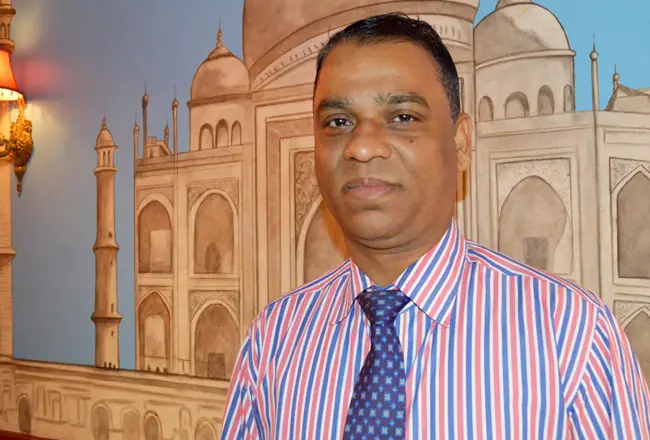Good reviews, Indian food and an American success story
When Mahammad Alam came to the U.S. in 1995 he had no idea that he”™d become an entrepreneur and, with others, wind up running a miniconglomerate of three Indian restaurants in Westchester.

While it might have been easier to remain in his native Bangladesh instead of pulling up roots and making the crossing to the U.S. where his brother was already living, Alam decided to take a chance at realizing The American Dream.
“When I came my brother was living in Brooklyn. It was difficult to get started,” Alam told the Business Journal. “When we grew up we had the British English. Here the English is different. The accent is different.”
Not being proficient in U.S. English did add to the difficulty of finding work.
“I was looking for jobs and at the time had a green card. I became a permanent resident and in 2001 became a U.S. citizen,” he said. “Eventually I started working in restaurants and got a job in what used to be the popular Indian restaurant in White Plains, the Bengal Tiger. While there, I learned how to communicate with the people and serve the people and take care of the people.”
Alam did know something about the restaurant business, having worked at an uncle”™s restaurant back in Bangladesh.
A cousin, Abdul Jalil, also had worked at the uncle”™s restaurant. He preceded Alam in coming to America and found himself working at the Malabar Hill, an Indian restaurant on Route 119 in Elmsford. Alam soon left Bengal Tiger to also go to work at Malabar Hill.
Jalil was one of the partners who joined with Alam to open the Mughal Palace restaurant in Valhalla in 2004. Situated at 16 Broadway, diagonally opposite the Metro-North train station, the restaurant, with only about 20 tables, started receiving positive reviews from food critics and drawing crowds.
“We made it within two years. Usually it takes three to five years,” Alam said. “When I was thinking about opening a restaurant, I was on a trip to England and did a lot of research on Indian restaurants there. Back in New York City, I started collecting menus from Indian restaurants. Then I worked to build a nice menu that would give people something unique.”
The word Mughal relates back to the Mughal Empire, which ruled most of India and Pakistan in the 16th and 17th centuries.
 Shortly after it opened, The New York Times food critic M.H. Reed wrote, in part, “A meal here can be impressive, a well-paced feast of smashing, distinctive dishes.”
Shortly after it opened, The New York Times food critic M.H. Reed wrote, in part, “A meal here can be impressive, a well-paced feast of smashing, distinctive dishes.”
The menu offers dishes from both the north and south of India, featuring almost a dozen tandoori specialties prepared in a tandoor (clay) oven such as lamb marinated in yogurt, lemon juice, ginger, garlic and special spices, and murgh tikka, which is chicken that has been similarly marinated.
“People like the flavors of Indian cuisine, but they don”™t always like the heat of the spices,” Alam said. “Many like it moderate without the heat, but we can prepare dishes to suit individual tastes.”
Alam is from the city of Chittagong in southeastern Bangladesh, which has a population of more than 2.5 million and is the country”™s second-largest city after Dhaka.
“My father has an exporting and importing business and we have a customs clearance license. At the time I came to the U.S., I was looking to build up something new, to take advantage of the opportunities here,” Alam said.
Back in the ”™90s, they were still dealing with the aftermath of the Bangladesh Liberation War in which the country broke away from Pakistan to achieve independence in 1971. Bangladesh itself had its roots in the 1947 separation of Bengal and India. The country, smaller than the state of Iowa, lies between Myanmar (Burma) and India.
The success in Valhalla started Alam working toward expansion while keeping a note of caution in mind.
“When one restaurant opens and does well, people open another one and then another one and another and then they go broke,” he said. “I”™ve seen the same thing over and over. They open one day and then go broke and close.”
With Jalil in 2007, Alam opened Rani Mahal at 327 Mamaroneck Ave. in Mamaroneck. Rani Mahal means “the Queen”™s Palace.” As with Mughal Palace, the menu presents dishes in the fine-dining classification and promotes a buffet lunch.
In 2018, Alam opened Ambadi Kebab & Grill at 141 E. Post Road in White Plains. It had previously been operated by the owner of the Bengal Tiger, which was located across the street and was destroyed in a fire. Alam”™s wife is managing that location. The name comes from Ambadi leaves, used in various Indian dishes. It also has a lunch buffet, which is aimed at attracting White Plains office workers. Alam expects business to continue growing especially when a new apartment project, now being built just down the street at Mamaroneck Avenue and East Post Road, opens.
“I introduced the lunch buffet as a sampler. It”™s like advertising. People can come in and try something different and whatever they like they can order from the menu at dinner or for takeout and delivery,” Alam said. “In Valhalla, I”™ve got 70% dining business and 30% delivery and takeout. In White Plains, about 25% of the business is dining in and 75% is takeout and delivery.”
Peter Katz”™s coverage of local business includes stories of immigrants making contributions to their communities. If you have a suggestion regarding someone who could be featured in the Business Journal”™s Only in America section, please contact him at pkatz@westfairinc.com.